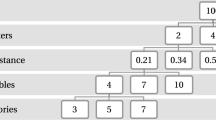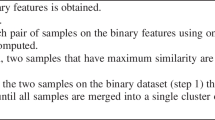Abstract
Data clustering concerns the discovery of partitions in data such that items from the same groups are as similar to each other as possible, and items from different groups are as dissimilar to each other as possible. The literature presents vast diversity on data clustering approaches, including systems that model the behavior of social individuals from different species. This work proposes a clustering algorithm that is reasoned upon the social theory of cognitive dissonance and the psychological theory of balance. We investigate whether psychological balance aware decision-making capabilities would affect the data clustering task. Partial results revealed the superiority of the proposed approach according to 5 out of 9 clustering quality metrics, when compared to other clustering algorithms.
Access this chapter
Tax calculation will be finalised at checkout
Purchases are for personal use only
Similar content being viewed by others
References
Cartwright, D., Harary, F.: Structural balance: a generalization of Heider’s theory. Psychol. Rev. 63(5), 277 (1956)
Cohen, S.C., de Castro, L.N.: Data clustering with particle swarms. In: 2006 IEEE International Conference on Evolutionary Computation, pp. 1792–1798. IEEE (2006)
Ester, M., Kriegel, H.P., Sander, J., Xu, X.: Density-based algorithm for discovering clusters in large spatial databases with noise. In: KDD-96 Proceedings, pp. 226–231. AAAI Press (1996)
Festinger, L.: A Theory of Cognitive Dissonance. vol. 2, Stanford University Press, Redwood (1957)
Flament, C.: Applications of Graph Theory to Group Structure. Prentice-Hall, Hoboken (1963)
Fritz, H., et al.: The psychology of interpersonal relations (1958)
Godois, L.M., Adamatti, D.F., Emmendorfer, L.R.: A multi-agent-based algorithm for data clustering. Prog. Artif. Intell. 9(4), 305–313 (2020). https://doi.org/10.1007/s13748-020-00213-3
MacQueen, J.B.: Some methods for classification and analysis of multivariate observations. In: 5th Berkeley Symposium on Mathematical Statistics and Probability, pp. 281–297. University of California Press, Okland(1967)
Mansour, E.M., Ahmadi, A.: A novel clustering algorithm based on fully-informed particle swarm. In: 2019 IEEE Congress on Evolutionary Computation (CEC), pp. 713–720 (2019)
Pedregosa, F., et al.: Scikit-learn: machine learning in python. J. Mach. Learn. Res. 12, 2825–2830 (2011)
Xu, R., Wunsch, D.C.: Clustering. Wiley-IEEE Press, Piscataway (2009)
Yang, L., Li, K., Zhang, W., Ke, Z., Xiao, K., Du, Z.: An improved chaotic ACO clustering algorithm. In: 2018 IEEE 20th International Conference on High Performance Computing and Communications; IEEE 16th International Conference on Smart City; IEEE 4th International Conference on Data Science and Systems (HPCC/SmartCity/DSS), pp. 1642–1649 (2018)
Zhu, W., Luo, W., Ni, L., Lu, N.: Swarm clustering algorithm: let the particles fly for a while. In: 2018 IEEE Symposium Series on Computational Intelligence (SSCI), pp. 1242–1249 (2018)
Author information
Authors and Affiliations
Corresponding author
Editor information
Editors and Affiliations
Rights and permissions
Copyright information
© 2021 Springer Nature Switzerland AG
About this paper
Cite this paper
Maciel, T.V., Emmendorfer, L.R. (2021). Cognitive Consistency Models Applied to Data Clustering. In: Rutkowski, L., Scherer, R., Korytkowski, M., Pedrycz, W., Tadeusiewicz, R., Zurada, J.M. (eds) Artificial Intelligence and Soft Computing. ICAISC 2021. Lecture Notes in Computer Science(), vol 12855. Springer, Cham. https://doi.org/10.1007/978-3-030-87897-9_17
Download citation
DOI: https://doi.org/10.1007/978-3-030-87897-9_17
Published:
Publisher Name: Springer, Cham
Print ISBN: 978-3-030-87896-2
Online ISBN: 978-3-030-87897-9
eBook Packages: Computer ScienceComputer Science (R0)




